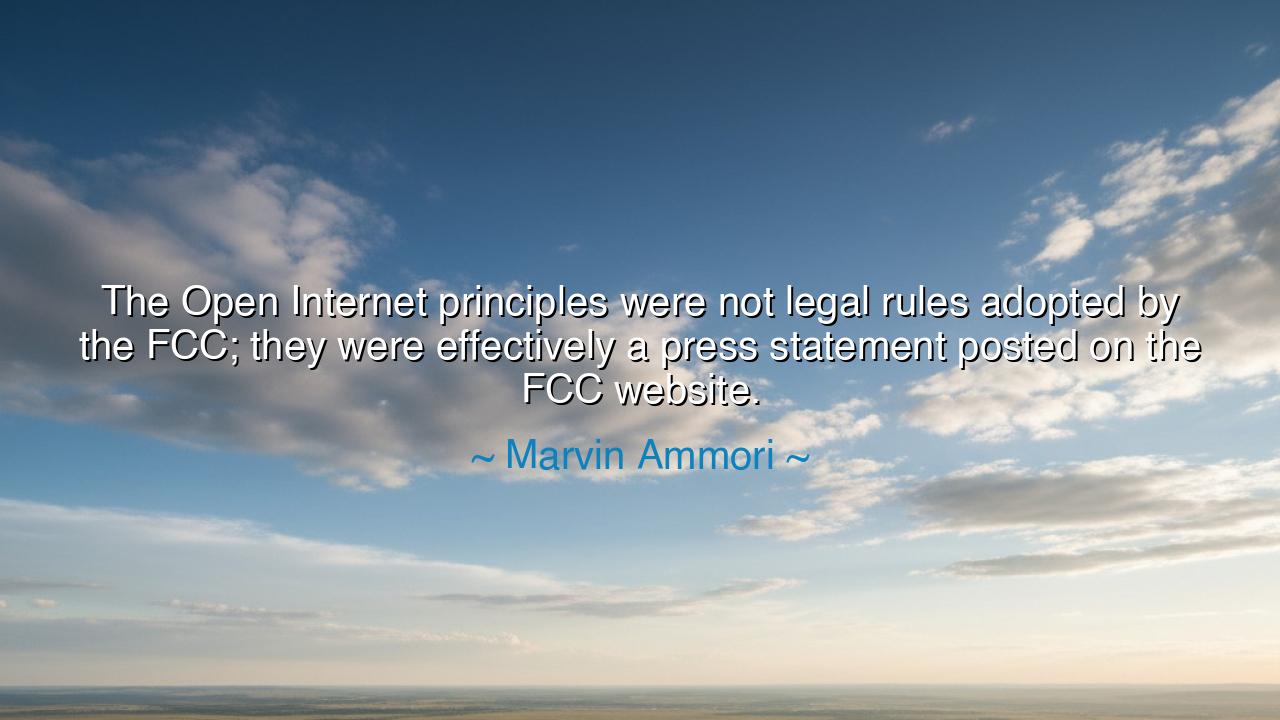
The Open Internet principles were not legal rules adopted by the
The Open Internet principles were not legal rules adopted by the FCC; they were effectively a press statement posted on the FCC website.






In the annals of human governance, there exists a delicate distinction between words and deeds, between proclamations that inspire and rules that bind. Marvin Ammori’s words, “The Open Internet principles were not legal rules adopted by the FCC; they were effectively a press statement posted on the FCC website,” illuminate this enduring truth. Here lies a meditation on authority, legality, and the power of form: a statement, no matter how noble, wields little force unless it is codified and recognized as law. Across the ages, civilizations have discovered that the difference between what is spoken and what is enforceable often decides the fate of justice itself.
From the courts of Athens to the chambers of the Roman Senate, the ancients understood that declarations alone could not compel action. Magistrates could proclaim edicts, yet until these edicts were inscribed, ratified, and disseminated according to proper procedure, they held little weight against those who sought advantage or ignored the mandate. Ammori’s observation is the modern echo of this timeless lesson: without formal adoption, the Open Internet principles were aspirations, not instruments of regulation, and their authority rested on persuasion rather than legal force.
History offers vivid illustration. In the early days of the United States, proclamations by leaders or heads of agencies occasionally aimed to guide commerce, public behavior, or civic conduct. Yet it was only when Congress codified laws, or when administrative agencies issued enforceable rules, that these directives carried tangible consequences. Similarly, the FCC’s Open Internet principles, though widely publicized and morally compelling, lacked the structure necessary for legal enforcement. They were words on a page, noble but without binding power.
Consider the practical ramifications. Internet service providers and digital platforms, though publicly advised to uphold the principles, were not legally bound to do so. Without codification, disputes could not be resolved through regulatory authority or courts, and the principles served more as guidance than command. Ammori’s reflection underscores the gap between intention and enforceability: principles inspire, but rules compel. This distinction is crucial for understanding the role of law in regulating emerging technologies.
A real-world example further illuminates this divide. During the early 2010s, debates over net neutrality intensified. The FCC posted the Open Internet principles as a statement of policy, yet companies continued to explore preferential treatment of traffic or throttling services. Only after formal rulemaking and the adoption of enforceable regulations could these principles carry legal weight, demonstrating that the power of the press statement alone was insufficient to govern complex technological landscapes.
The philosophical lesson extends beyond digital governance. Authority must be codified to wield power; principles alone cannot enforce themselves. Societies that rely solely on declarations without legal underpinning risk confusion, dispute, and erosion of trust. Ammori’s words remind us that effective governance is not merely aspirational but procedural: the law gains its force through formalization, recognition, and adherence to established mechanisms of enforcement.
Practically, this teaching calls for attentiveness and action. Recognize the difference between aspirational guidance and enforceable rule, and act accordingly. For citizens, businesses, and policymakers, this distinction informs compliance, advocacy, and strategic planning. When principles are announced without legal adoption, vigilance and proactive engagement become necessary to ensure that intentions evolve into binding protections.
Thus, Marvin Ammori’s observation resonates as timeless counsel: words inspire, but law commands; statements guide, but rules govern. Let those who navigate complex systems, whether of technology, commerce, or governance, remember that the legitimacy of authority is measured not by eloquence or moral appeal, but by the structures, procedures, and recognition that render it enforceable. In this lies the enduring wisdom of civilization: to convert principle into power, one must codify, formalize, and act within the structures of law.






AAdministratorAdministrator
Welcome, honored guests. Please leave a comment, we will respond soon